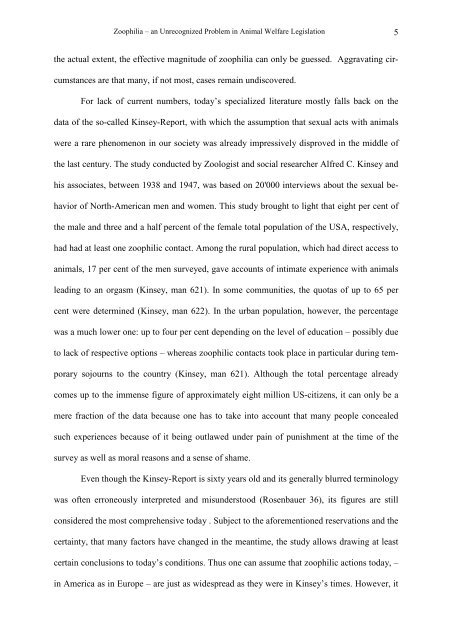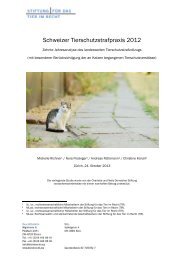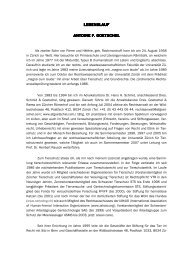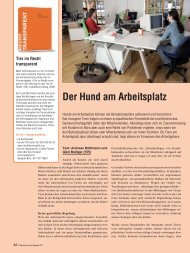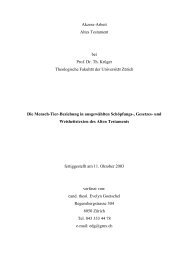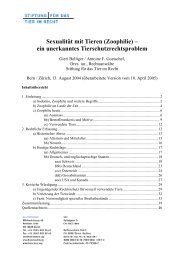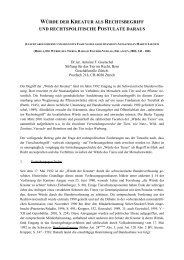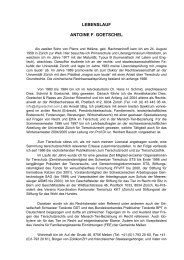Zoophilia an Unrecognized Problem in Animal Welfare Legislation
Zoophilia an Unrecognized Problem in Animal Welfare Legislation
Zoophilia an Unrecognized Problem in Animal Welfare Legislation
Create successful ePaper yourself
Turn your PDF publications into a flip-book with our unique Google optimized e-Paper software.
<strong>Zoophilia</strong> – <strong>an</strong> <strong>Unrecognized</strong> <strong>Problem</strong> <strong>in</strong> <strong>Animal</strong> <strong>Welfare</strong> <strong>Legislation</strong><br />
the actual extent, the effective magnitude of zoophilia c<strong>an</strong> only be guessed. Aggravat<strong>in</strong>g cir-<br />
cumst<strong>an</strong>ces are that m<strong>an</strong>y, if not most, cases rema<strong>in</strong> undiscovered.<br />
For lack of current numbers, today’s specialized literature mostly falls back on the<br />
data of the so-called K<strong>in</strong>sey-Report, with which the assumption that sexual acts with <strong>an</strong>imals<br />
were a rare phenomenon <strong>in</strong> our society was already impressively disproved <strong>in</strong> the middle of<br />
the last century. The study conducted by Zoologist <strong>an</strong>d social researcher Alfred C. K<strong>in</strong>sey <strong>an</strong>d<br />
his associates, between 1938 <strong>an</strong>d 1947, was based on 20'000 <strong>in</strong>terviews about the sexual be-<br />
havior of North-Americ<strong>an</strong> men <strong>an</strong>d women. This study brought to light that eight per cent of<br />
the male <strong>an</strong>d three <strong>an</strong>d a half percent of the female total population of the USA, respectively,<br />
had had at least one zoophilic contact. Among the rural population, which had direct access to<br />
<strong>an</strong>imals, 17 per cent of the men surveyed, gave accounts of <strong>in</strong>timate experience with <strong>an</strong>imals<br />
lead<strong>in</strong>g to <strong>an</strong> orgasm (K<strong>in</strong>sey, m<strong>an</strong> 621). In some communities, the quotas of up to 65 per<br />
cent were determ<strong>in</strong>ed (K<strong>in</strong>sey, m<strong>an</strong> 622). In the urb<strong>an</strong> population, however, the percentage<br />
was a much lower one: up to four per cent depend<strong>in</strong>g on the level of education – possibly due<br />
to lack of respective options – whereas zoophilic contacts took place <strong>in</strong> particular dur<strong>in</strong>g tem-<br />
porary sojourns to the country (K<strong>in</strong>sey, m<strong>an</strong> 621). Although the total percentage already<br />
comes up to the immense figure of approximately eight million US-citizens, it c<strong>an</strong> only be a<br />
mere fraction of the data because one has to take <strong>in</strong>to account that m<strong>an</strong>y people concealed<br />
such experiences because of it be<strong>in</strong>g outlawed under pa<strong>in</strong> of punishment at the time of the<br />
survey as well as moral reasons <strong>an</strong>d a sense of shame.<br />
Even though the K<strong>in</strong>sey-Report is sixty years old <strong>an</strong>d its generally blurred term<strong>in</strong>ology<br />
was often erroneously <strong>in</strong>terpreted <strong>an</strong>d misunderstood (Rosenbauer 36), its figures are still<br />
considered the most comprehensive today . Subject to the aforementioned reservations <strong>an</strong>d the<br />
certa<strong>in</strong>ty, that m<strong>an</strong>y factors have ch<strong>an</strong>ged <strong>in</strong> the me<strong>an</strong>time, the study allows draw<strong>in</strong>g at least<br />
certa<strong>in</strong> conclusions to today’s conditions. Thus one c<strong>an</strong> assume that zoophilic actions today, –<br />
<strong>in</strong> America as <strong>in</strong> Europe – are just as widespread as they were <strong>in</strong> K<strong>in</strong>sey’s times. However, it<br />
5


